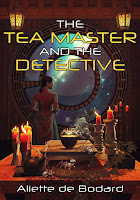The Pride of Jai was supposed to be humanity's greatest accomplishment—a space station made entirely by humans and their primitive computers, without "divine" cyber-technology provided by the sentient quantum supercomputers worshipped as Gods. And it was supposed to be a personal triumph for its young lead scientist, physicist Yasira Shien, whose innovative mathematics was key to the reactor powering it.
But something goes wrong in Yasira's reactor, leading to an unexplained singularity that destroys The Pride of Jai and most of the people on it—and placing Yasira in the sights of angry Angels, the cyborg servants of the Gods.
According to the angels, Yasira's reactor malfunction was the latest in a rising tide of disasters, intentionally caused to exploit vulnerabilities in the very pattern of spacetime and usher in horrific beings from beyond reality itself. They believe that the woman behind the disasters is Yasira's long-vanished mentor, Dr Evianna Talirr—and they believe that Yasira, Dr Talirr's favorite student, is the only one who can help them find her.
Spirited off to the edge of the galaxy and with her whole planet's fate, and more, hanging in the balance, Yasira must decide who to trust: the ruthless angels she was always taught to obey without question—or the heretic scientist whose plans could change everything she knows to be true about reality.
Really, the most interesting part of this story was the world-building and everything that went with it. From the very beginning, we see that humanity has spread through the galaxy, but that their level of technological advancement isn't necessarily what we might normally expect. As we learn fairly early on, this is because the gods have declared certain technologies to be heretical — in particular, anything that comes close to AI since the gods themselves are very advanced AIs. They allow people use (god-built) advanced technology such as portals, but prevent humanity from fully understanding how it works. This is the climate in which our protagonist, Yasira, finds herself accidentally building heretical technology. And not just any technology, technology that malfunctions unusually and gets a lot of people killed.
This kicks off a story in which Yasira is pulled around by powerful people with competing interests while, at first, she doesn't fully understand what's going on. Although there's a lot of dramatic science fiction (bordering on horror) stuff going on, at its core the story is about Yasira's journey of self-discovery and understanding. We see her being different things to different people and, eventually, coming to understand who she is to herself. All this against a backdrop of science fiction horror events — although I want to stress the book itself isn't horror, it contains some elements borrowed from the genre.
In the end, good books can be the hardest to review. I liked The Outside for the reasons mentioned above (though how much I can keep repeating the phrase "world-building" without straying into spoiler territory, I don't know). It also worked well as a package and, intrigued as I was by the setting, I would definitely be interested in reading more set in this world, whether or not it's about the same characters. The book is self-contained but was left open for possible "further adventures", so I'm crossing my fingers. I highly recommend this book to fans of science fiction, perhaps with a dash of horror, weird science (although it's not heavy science, aside from a few irrelevant details near the start), and moral ambiguity. I will definitely be keeping my eye out for more from this author.
5 / 5 stars
First published: June 2019, Angry Robot
Series: I don't think so, but there's potential for more books in the series, which I would definitely be up for
Format read: eARC
Source: Publisher via NetGalley















